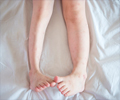Loss of muscle and body weight are associated with disability in stroke patients, reveals a new study.

TOP INSIGHT
Loss of muscle and body weight are associated with disability after stroke, reveals a new study. The study findings could pave the way for treatment options such as dietary supplementation and exercise training to prevent muscle wasting after stroke.
Read More..
"Stroke is the main cause of adult disability, and it is a common understanding that this is all due to brain injury and impaired innervation," she continued. "Our findings show that the amount of skeletal muscle throughout the body declines after stroke. This opens the door for treatment options such as dietary supplementation and exercise training to prevent muscle wasting after stroke."
The study examined changes in body weight and composition during the year after an ischaemic stroke and their association with disability. The researchers found that 21 percent of patients had developed cachexia one year later, meaning they had lost at least 5 percent of their body weight. This included the loss of 19 percent of their body fat and 6.5 percent of their muscle mass. Notably, this body wasting occurred equally in patients with and without limb paresis.
Patients with cachexia had a significantly lower functional capacity and significantly lower handgrip strength than those without cachexia.
Dr. Scherbakov said: "The disability caused by stroke is usually attributed to brain damage, with little attention paid to the effector organ, which is the skeletal muscle. Exercise training is the most promising way to delay or prevent the progression of muscle wasting and may be a therapy option. Treatment of cachexia includes dietary supplementation with protein, vitamins, and minerals, and might also prevent muscle wasting after stroke."
Patients with cachexia had significantly higher levels of inflammation in the body, as measured by C-reactive protein (CRP) in the blood than those without cachexia. Patients with systemic inflammation had a fivefold greater risk of muscle wasting, 11 percent higher risk of weight loss, 30 percent greater chance of reduced appetite, and 6 percent higher likelihood of low handgrip strength.
The study was conducted in the Stroke Unit, Department of Neurology, Charité Campus Virchow Clinic, Berlin, in 150 patients with mild to moderate ischaemic stroke recruited within 48 hours after stroke. Baseline measurements included body weight; body composition by dual-x-ray absorptiometry; functional status by the National Institutes of Health Stroke Scale (NIHSS), modified Rankin scale, and Barthel index; and muscle strength by handgrip and quadriceps tests. The measurements were repeated one year later.
Source-Eurekalert
 MEDINDIA
MEDINDIA




 Email
Email










